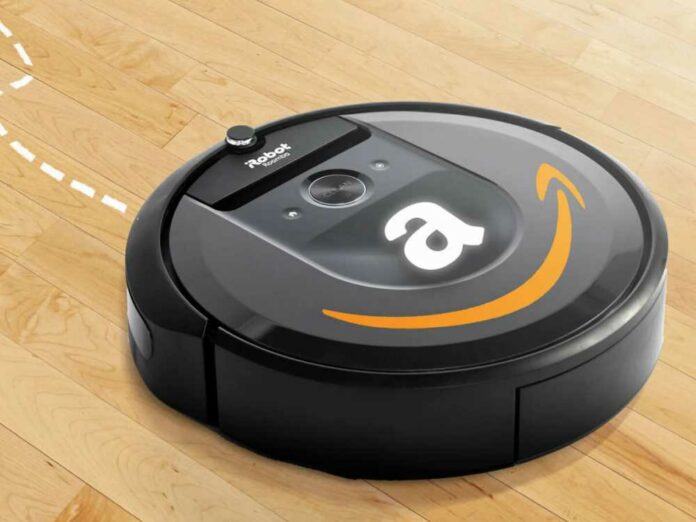Amazon's acquisition of iRobot is under deep antitrust scrutiny in the European Union.
The $1700 billion deal for the e-commerce giant to acquire the robot vacuum cleaner, announced just under a year ago, was approved by competition regulators in the United Kingdom last month. But EU regulators are now stepping in for their own analysis.
In a published note, the Commission said it is concerned that the transaction will allow Amazon to restrict competition in the robotic vacuum cleaner (RVC) market and strengthen its position as a supplier to the online marketplace in various ways.
Discussing its preliminary concerns, the EU said it found Amazon's marketplace to be a "particularly important channel" for selling RVCs in several EU Member States and is concerned that the tech giant may have the ability and incentive to exclude iRobot's rivals by preventing them from selling competing products in their marketplace or degrading their access through strategies such as preferring iRobot kit on ad listings and blocking rivals from accessing certain ad services, with the net effect of increasing the costs for rivals to advertise and sell in your market.
“Such enforcement strategies could restrict competition in the RVC manufacturing and supply market, resulting in higher prices, lower quality, and less innovation for consumers,” the Commission said.
also him There are concerns that Amazon may try to shut down or downgrade rivals' access to APIs for its AI assistant software. Alexa.
“Interoperability with Alexa software and access to WWA ['Works With Alexa'] certification appears to be a major selling point for RVC manufacturers and suppliers to compete,” he noted.
Additionally, the Commission is concerned about the data advantage that Amazon would gain by owning iRobot.
“Amazon would gain access to iRobot user data, including: (i) information provided by iRobot RVC users; (ii) information collected by iRobot RVCs; and (iii) information collected by iRobot from third parties. “This data can provide Amazon with a significant advantage in the market for online marketplace services for third-party sellers (and related advertising services) and/or other data-related markets,” he suggests.
“For example, iRobot data may allow Amazon to better rank organic results and ads on its own marketplace and/or better personalize and target ads, making it more difficult for rival marketplace providers to match marketplace services on Amazon line. Therefore, the transaction may create barriers to entry and expansion for Amazon's competitors to the detriment of consumers.”
In a statement, the European bloc's competition chief, Margrethe Vestager, said:
«Amazon is both an online marketplace and a retailer. We are concerned that by acquiring iRobot, Amazon could use that dual role to block iRobot's rivals from its market. With our in-depth investigation, we will also look at whether Amazon would use the data collected by iRobot to strengthen its position as an online marketplace provider. "We want to ensure that Amazon's acquisition of iRobot does not have a negative impact on businesses and consumers by distorting competition in relevant markets."
The EU will now carry out an in-depth investigation of the proposed acquisition to test whether its preliminary concerns are justified.
Regulators have until November 15 to make a decision on authorization.
If competition concerns persist, the Commission is likely to seek behavioral remedies from Amazon rather than seeking an outright blocking of the deal. The bloc has a track record of approving tech mergers and acquisitions even when concerns are high, such as Google's controversial purchase of Fitbit, which the EU cleared in late 2020 after agreeing to commitments regarding Fitbit's API. and a promise from Google not to use Fitbit users' health data for advertising for ten years.
Google has since said that it will be mandatory for Fitbit users to migrate to Google Accounts by 2025, ruling out the option to sign in with a separate Fitbit account. The tech giant has also degraded the Fitbit user experience, as TechRadar reported earlier this year, even removing the ability to download music files on Fitbit smartwatches. It also removed access to certain music apps, widening the feature set gap between its own Pixel line of smartwatches (which have more ways to play music) over the Fitbit-branded watches it now also owns.
The Commission's reluctance to block tech mergers and acquisitions extends even to situations where other regulators are inclined to deny deals. Like, in a recent high-profile example, Microsoft's Activision acquisition, which was approved by the EU in May but blocked by the UK in April.
In the US, the FTC is also seeking an injunction against the transaction. But the EU walked away from the $68.7BN deal after agreeing to solutions from Microsoft, such as promising not to prevent regional consumers from streaming all current and future Activision games through rival cloud gaming services for the next 10 years.
Amazon was contacted for comment on the EU investigation. A company spokesperson sent this statement:
«We continue to work through the process with the European Commission and are focused on addressing their questions and any concerns identified at this stage. Facing intense competition from other vacuum cleaner suppliers, iRobot offers practical and innovative products. We believe that Amazon can offer a company like iRobot the resources to accelerate innovation and invest in critical features while reducing prices for consumers.«




